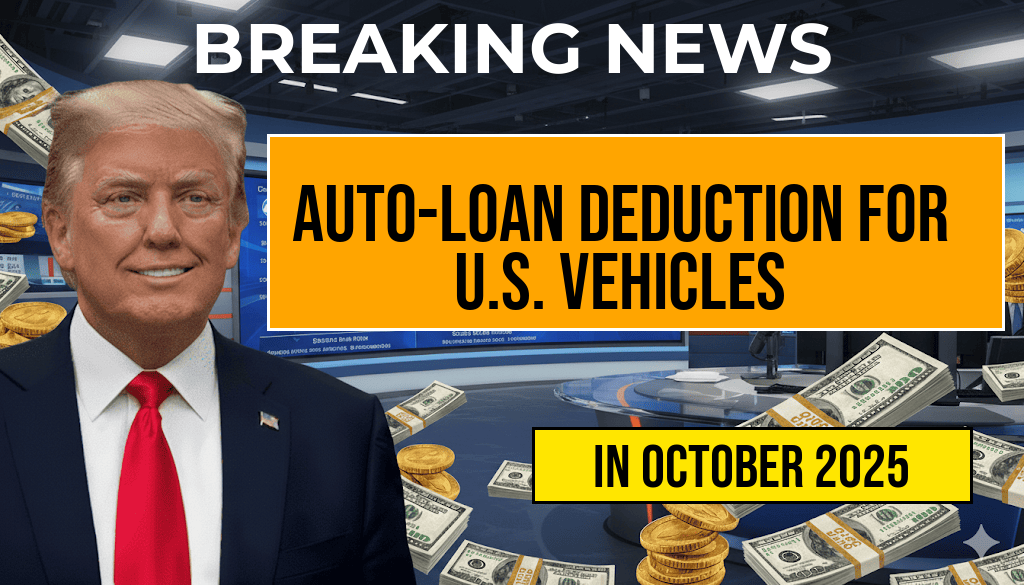The U.S. government has introduced a new tax incentive aimed at encouraging the purchase of American-assembled vehicles. Under this initiative, qualifying consumers can deduct up to $10,000 in auto loan interest costs when purchasing vehicles assembled within the United States. This policy aims to bolster domestic manufacturing and stimulate consumer interest in American-made automobiles amid ongoing industry shifts. The deduction applies to personal income tax filings and is available for eligible vehicle purchases made within the calendar year, providing a potentially significant financial benefit for buyers who finance their vehicles through loans. As automakers and policymakers navigate supply chain challenges and changing market demands, this tax incentive represents a strategic effort to reinforce the competitiveness of U.S.-built vehicles in a competitive global market. The specifics of eligibility, qualifying vehicle criteria, and implementation details are expected to shape consumer behavior and industry dynamics in the months ahead.
Details of the Auto-Loan Interest Deduction Policy
Scope and Eligibility
- The deduction applies exclusively to vehicles assembled within the United States, including major automakers’ North American plants.
- Consumers must finance their vehicle purchase through a qualifying loan to benefit from the interest deduction.
- The vehicle must be used primarily for personal transportation, not commercial purposes.
- The policy covers new vehicle purchases made during the current tax year, with a maximum deductible interest of $10,000.
Tax Benefits and Limitations
| Feature | Details |
|---|---|
| Maximum Deduction | $10,000 in interest paid over the life of the loan |
| Eligible Vehicles | American-assembled vehicles, including sedans, SUVs, and trucks |
| Loan Type | Personal auto loans, not lease agreements |
| Claiming the Deduction | Itemized deduction on Schedule A of federal income tax return |
Industry and Consumer Response
Automaker Strategies
Major automakers have expressed support for the policy, viewing it as a means to promote U.S. manufacturing and reinforce consumer confidence in domestically assembled vehicles. Critics, however, warn that the policy might favor higher-income individuals who typically finance larger vehicle purchases, potentially widening disparities in vehicle ownership costs.
Consumer Impact
For consumers planning to buy a new vehicle, especially those considering financing options, the deduction could translate into significant savings. For example, a buyer financing a $40,000 vehicle with a 4% interest rate over five years might pay roughly $3,000 in interest annually. Deducting up to $10,000 could reduce the effective interest costs over the loan period, making American-made vehicles more financially attractive.
Economic and Policy Context
Supporting Domestic Manufacturing
The policy aligns with broader efforts to bolster the U.S. auto industry, which has faced challenges from international competition and supply chain disruptions. Automakers like Ford, General Motors, and Stellantis have invested heavily in U.S. plants, aiming to capitalize on the new tax incentive to increase domestic vehicle sales. According to industry reports, U.S.-assembled vehicles now constitute a significant portion of new car sales, with the policy expected to accelerate this trend.
Tax Policy and Broader Incentives
The auto-loan interest deduction complements existing federal programs promoting electric vehicles, such as tax credits for EV purchases. Experts suggest that combining these incentives could further boost American manufacturing and reduce reliance on foreign supply chains. However, some fiscal conservatives have raised concerns about the potential cost to government revenue, arguing that the policy may disproportionately benefit wealthier consumers with higher loan amounts.
Implementation and Future Outlook
Administrative Details
The Internal Revenue Service (IRS) is expected to issue detailed guidelines outlining the application process, documentation requirements, and specific vehicle eligibility criteria. Consumers will need to retain records of their financed purchase and interest payments to claim the deduction accurately. The policy is scheduled to be reviewed annually to assess its effectiveness and make adjustments as necessary.
Potential Market Effects
Analysts anticipate that the policy could lead to increased sales of U.S.-assembled vehicles, especially in segments like trucks and SUVs where financing is common. Additionally, automakers may accelerate production and marketing efforts to capitalize on the incentive, potentially leading to a temporary boost in domestic manufacturing output. Long-term impacts will depend on legislative developments, market responses, and broader economic conditions.
For more on the U.S. auto industry and federal incentives, see Wikipedia’s page on the U.S. automotive industry and Forbes’ coverage of automotive policies.
Frequently Asked Questions
What is the maximum auto-loan interest deduction available for U.S.-assembled vehicles?
The maximum **auto-loan interest deduction** available for **U.S.-assembled vehicles** is **ten thousand dollars**.
Who qualifies for the **auto-loan interest deduction** on U.S.-assembled vehicles?
Taxpayers who have financed **U.S.-assembled vehicles** and meet the necessary **loan and usage criteria** qualify to claim the **interest deduction** on their federal taxes.
Are there specific requirements for a vehicle to qualify as **U.S.-assembled**?
Yes, the vehicle must be **assembled in the United States**, with a significant portion of its parts manufactured domestically, to qualify for the **auto-loan interest deduction**.
Can I deduct the **interest on multiple auto loans** for different U.S.-assembled vehicles?
Yes, you can deduct the **interest** on multiple **auto loans**, but the total deduction for **U.S.-assembled vehicles** is capped at **ten thousand dollars**.
How do I claim the **auto-loan interest deduction** on my tax return?
You should itemize your deductions using **Schedule A** and include the **interest paid** on your **auto loan** for a **U.S.-assembled vehicle**, ensuring it qualifies under the current IRS guidelines.








